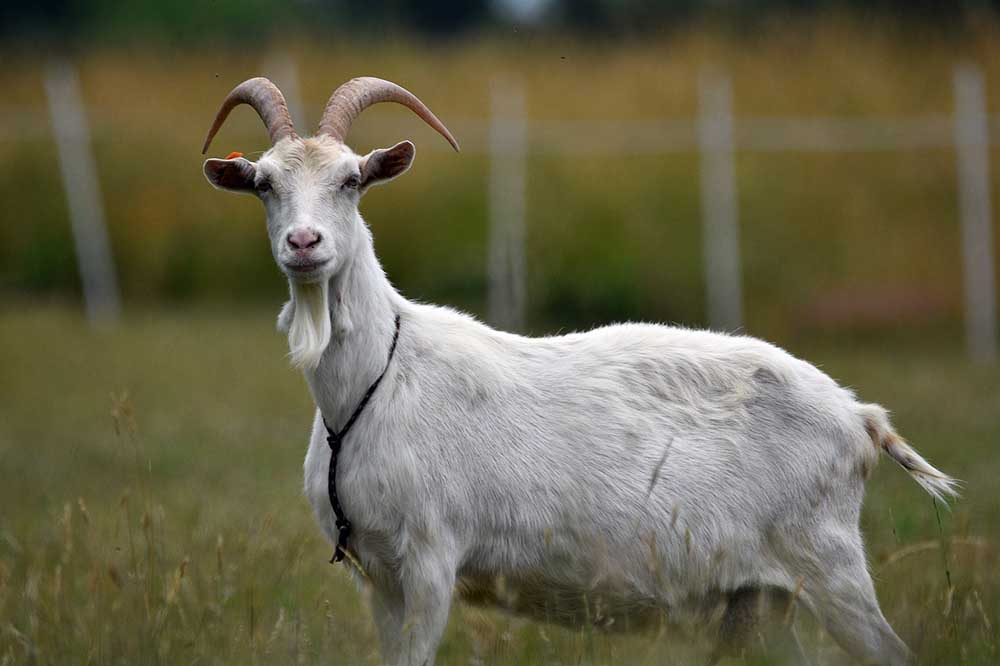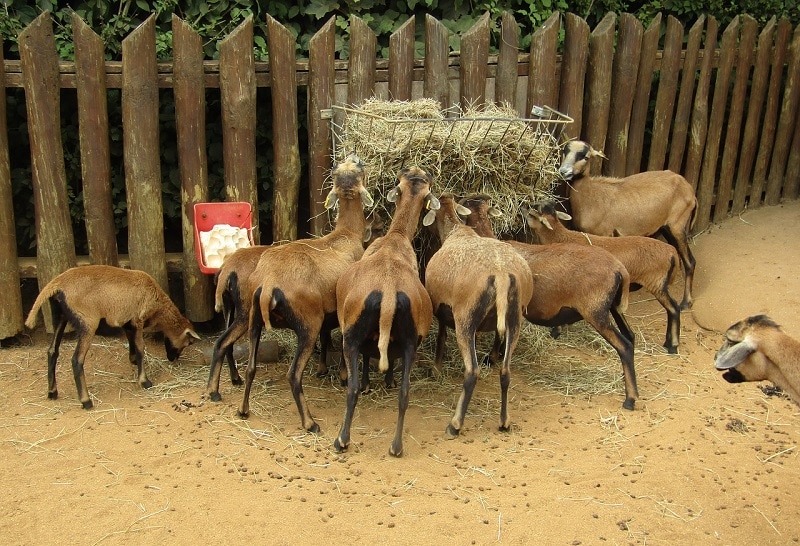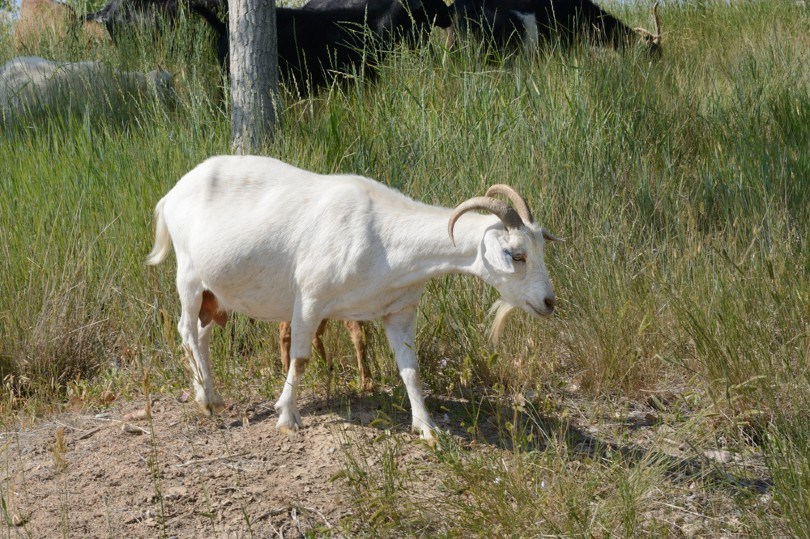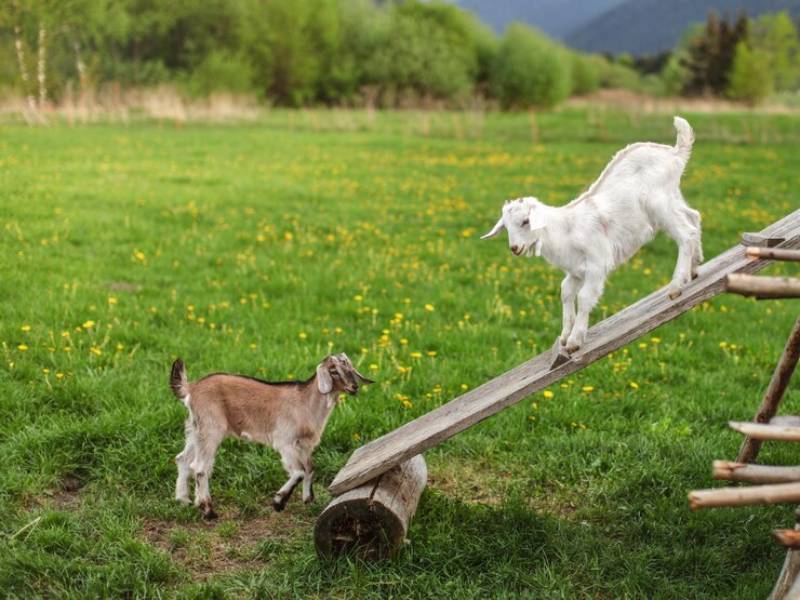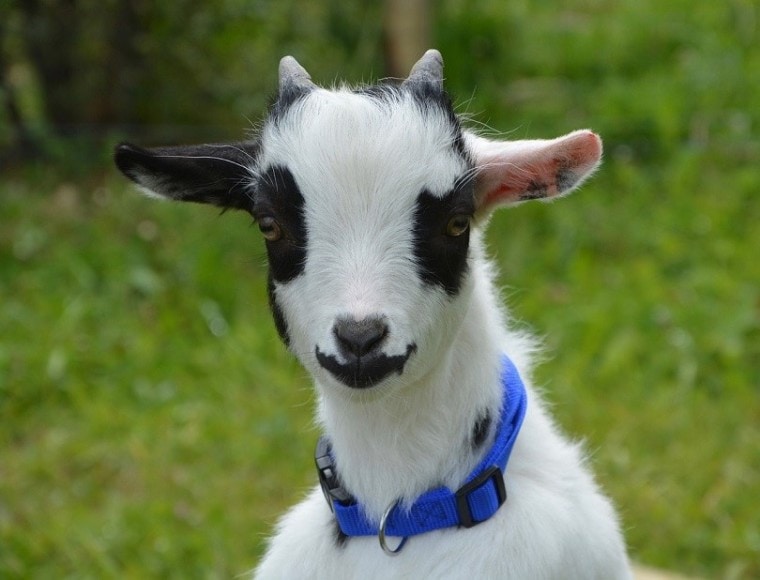
What’s not to love about little baby goats? They have adorable looks, sweet demeanors, and entertaining personalities. You’ve surely seen all the videos online showing miniature goats, or pygmy goats, getting into all sorts of mischief—and it’s hilarious. It’s tempting to want to get a few of your very own! And why not, miniature goats can make excellent pets if you have a clear understanding of what to expect from having such a pet.
Since these fun-loving, spirited escape artists are so appealing, you might be wondering if the reality is as good as the dream. What exactly can you expect when you own a miniature goat? Do you have the patience, resources, space, and knowledge to deal with their unique needs?
A Little About Miniature Goats
Miniature goats are tons of fun and loads of work. Many owners love them because of their unique, charming personalities—and their quirks are pretty entertaining, too. But before you commit to owning a goat, you should research them as much as possible.
These goats are somewhat high-maintenance pets, so take notice of a few noteworthy things.
The 15 Things to Know Before Bringing a Goat Home
1. There Are Different Types of Miniature Goats
Ultimately, it all comes down to your personal preference. All miniature goats have the potential to make fabulous additions to your barnyard.

2. Miniature Goats Are Terrific Choices for Kids & Older Adults
Because miniature goats usually have friendly personalities, they can be excellent picks for children and older adults. If your child is just learning the ropes on the farm—this is an ideal pet to have. Not only are they incredibly interactive, but they are also intuitive and loving.
Even though they can be a little on the unruly side from time to time, they are still easy to manage. Early socialization and training up the chances of having an ultra-agreeable goat. If they encounter a wide variety of people and animals, they will be more receptive to new things.
3. Miniature Goats Are Very Social
Miniature goats will love interacting with creatures of all sorts. Known for their bravery and curiosity, these animals won’t meet a stranger. They will follow you around outside just to see what you’re up to. Some can be much friendlier than others, but overall—each miniature goat has a strong personality.
If you were looking for a barnyard pet you could spend a lot of time with, then a mini goat might be a terrific choice. They will love engaging in play. The younger you get your goat, the more they will warm up to you. They will be very bonded to their other barnyard friends and their humans.

4. Miniature Goats Need Friends
Miniature goats don’t do well as solo pets. These little ones are highly dependent on other goat friends. If you plan to buy one, always make sure you opt for at least a pair. They love running around, playing with, and learning from one another—even if it means double trouble. Unfortunately, solely human friends just won’t cut the mustard.
If you can’t have another goat to keep your company, you should probably choose another pet. The lack of a herd is a real problem for these creatures, leading to more significant health issues.
5. Miniature Goats Are Easy to Handle
Due to their size and peaceful nature, miniature goats are much easier to handle than some other goat breeds. The maximum weight for any miniature goat is under 80 pounds (36 kg).
Don’t get us wrong, you won’t be able to carry these goats around like babies—although that would be very cute. However, their small stature makes it easy to keep things under control.
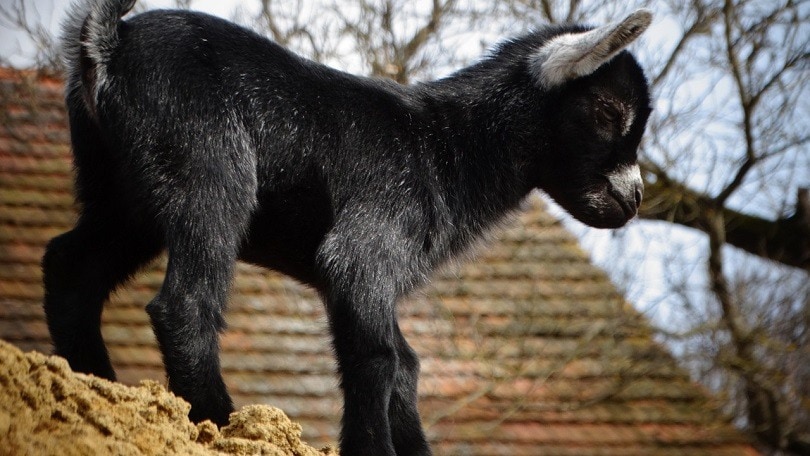
6. Miniature Goats Use Up Resources
Don’t let their cuteness fool you—goats require lots of care. From their living quarters to their daily feeding, you can rack up costs and time requirements quickly. In a year, the average cost of owning two miniature goats is roughly $2,000 to $3,000. The cost to buy the miniature goat ranges from $40 to $350 and up depending on quality and breeding.
These averages include feeding, housing, and vet care. Actual costs can be much more depending on any health issues your goat might have. When you hash out the details, always leave wiggle room for any emergencies or unexpected issues that might arise.
7. Miniature Goats Can Be Ornery
Goats are known for their mischievous personalities. They can really get into trouble sometimes. They might also be very destructive toward your property. You might not be able to let your goats free-range without constant supervision.
Since they’re smaller, they might be able to squeeze into places you’d rather they not go. But on the other hand, miniature goats are sometimes more docile and gentler than their larger goat cousins.

8. Miniature Goats Have Law Requirements
Since goats are considered livestock, you need to check with your local laws to see the stance. Some areas require permits, others you can’t have livestock in specific residential neighborhoods. The last thing you would want to do is get a few goats only to find out you can’t keep them.
If you live on several acres and already have livestock, this might not even be a worry for you. You more than likely already know how it works around your area.
9. Miniature Goats Need Lots of Space
If you have a tiny yard, it might not work out. Even though they’re small, they still require a lot of space to roam. On average, a singular miniature goat requires at least 30 square feet to graze. While this might not be an issue for some living situations, you may not have a large enough yard to spare.
Goats are very small, energetic creatures that bore quite easily. They need tons of activities and stimulation to keep them busy. These goats also benefit from grazing—it will be a regular part of their daily routine.

10. Miniature Goats Require Secure Fencing
Miniature goats are escape artists, managing to squeeze and chew through just about anything. Providing a secure, safe space for your goat should be an utmost priority. They can easily chew up particular finds of fencing. They can also headbutt their way out of things, and even jump over obstacles.
You can’t use inexpensive options like plastic or thin metal wire. The best type of fencing for goats is welded or woven wire. It has to be sufficiently tall though (at least 6 feet high for miniature goats).
11. Miniature Goats Are Fantastic Climbers
It wouldn’t be an unusual circumstance to come out of the house to find a free-ranging goat on top of your car. Goats might have hooves, but they love climbing—and they will do so. Goats can get out of, on top of, and inside anything they want. You might say they have an insatiable wanderlust.
Don’t let their small size fool you, they are quite capable of getting where they want to go. You might be shocked once you see the places they manage to weasel into.

12. Miniature Goats Require Regular Hoof Trims
Your goats will need to have regularly scheduled hoof trims. The amount of time between trims varies depending on the environment the goat lives in. Harsher terrain can file the hooves, making them grow slower and need less work. Walking mostly on softer soils will require more frequent trims.
Goats might get hoof infections like hoof rot, so inspections are necessary. You can trim their hooves at home once you get the hang of it. But unless you know exactly what you’re doing, it’s best to leave it to the professionals.
13. Miniature Goats Can Produce Milk
If you have female goats, they can produce milk. They only start producing milk once they get pregnant, so if you don’t plan on breeding your goat, you don’t need to worry. Some people prefer to breed their goats to continue to get milk.
Some goats might produce milk without having kids. This is a phenomenon known as precocious udder. It doesn’t happen often, but it isn’t unheard of either. The primary cause for this condition is thought to be a hormonal imbalance.

14. Miniature Goats Can Be Picky Eaters
Goats have a solid reputation for eating everything in sight. But the truth is, goats don’t eat things like tin cans and other inedible objects. They are merely curious, loving to sample foliage that other farm animals might avoid. You could say they have a more developed palate.
Goats love to try new things, but they won’t like every commercial food on the market. Don’t be surprised if they turn up their nose every once in a while. Or, a snack they used to love might not strike their fancy anymore. You just have to roll with the punches and cater to the fuss.
15. Miniature Goats Are Rewarding Pets
In the right living situation, miniature goats are incredibly rewarding pets. They have notable personalities, adding lots of character to your farm or mini-farm.
Goat owning might be challenging, but it’s definitely a worthwhile experience. As cool as they are, they aren’t for everyone. So, always make sure you’re 100% committed to the responsibility before you make your choice.

Your Before Adoption Checklist
Knowing that you’re about to be on the market for a few goats can be so exciting. But before you jump in over your head, you’ll want to follow a few steps first.
Final Thoughts
Remember always to get more than one goat—and look out! Mischief is probably afoot. Always stay two steps ahead. These hooved little cuties need constant supervision, but they are incredibly lovable and sweet—so it evens out.
Miniature goats won’t be right for everyone. Not every person has the amount of space, fencing, time, or resources to care for them. But if you do, you will have a very pleasing time raising them.
- You might be interested: How Often Do Goats Go Into Heat (Plus Signs to Look For)
Featured Image Credit: JacLou, Pixabay





